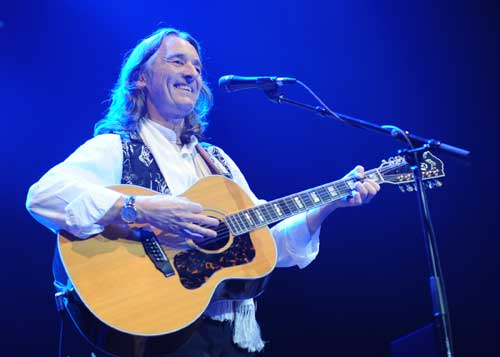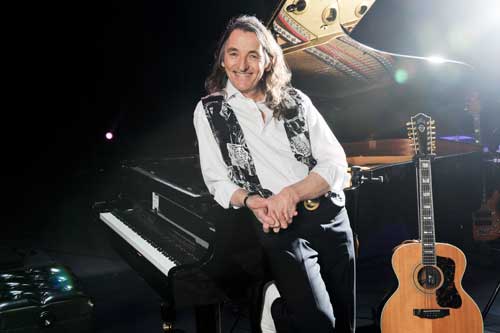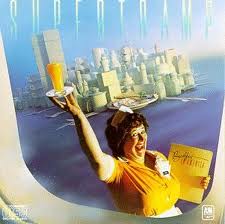A Conversation with Supertramp's Roger Hodgson
Mike Ragogna: Roger, it's obvious that Breakfast in America is one of the classic albums of the seventies. Do you see that it has a significance, topically, in 2012?
Roger Hodgson: From the multi-generations that I'm seeing in audiences around the world and what I still hear on the radio in every country, Breakfast in America and especially the songs I wrote--"The Logical Song," "Breakfast in America," "Take the Long Way Home," "Lord is it Mine?" and "Child of Vision" have stood the test of time incredibly well and when I play them onstage, they still sound as fresh and relevant today as when I wrote them. My shows don't feel like nostalgia shows. There is something very wonderful that happens--they are almost like a celebration of life and, obviously, the songs and what they are about and the part they've played in people's lives has a lot to do with it.
MR: Breakfast in America seemed like a giant shoutout to the States. How would you describe the theme of the album?
RH: We had been living in America for quite a few years by the time we recorded Breakfast in America, and the California lifestyle had rubbed off on us. For me, it was always about choosing the strongest combination of songs from what Rick Davies had written and from the large pool of songs that I always had in my arsenal. We didn't set out to make any kind of album, the songs just fell into place like they did. I wrote "The Logical Song" on the previous tour and it suited the band, Rick came up with "Goodbye Stranger." I wrote "Take the Long Way Home" just before we went into the studio. Breakfast in America had been around for 12 years--I wrote it when I was 18 in England dreaming of coming to America, and it felt like it fit with the mood of the other songs. So even though it was hard work (the album took eight months to complete), I knew the collection of songs was strong and we had to get it right and I ended up sleeping at the studio for the last month to make sure of that.
MR: How did the album's success affect the group at the time, and did it play into how you recorded and toured afterward?

photo courtesy UME
RH: I always say the greatest test of a band is success, and we were no different. Success came slowly for us--over a period of six albums and almost a decade. The success of Breakfast..., plus the fact that we all started having families created competing priorities and competing dynamics between the band members and our wives, and things started becoming more complicated.
I have always tried to follow my heart and my instincts in life and that's why I chose to move from away from Los Angeles, away from the music scene at the peak of Supertramp's success in 1983 to stay at home and be with my children growing up and learn how to be a father. I believe that my time away from the music industry is the reason why I'm still enjoying touring now and feel I'm in my prime.
MR: Can you go into how you created "The Logical Song"?
RH: "The Logical Song" was a very personal lyric for me. I had actually finished the words and the arrangement six months before I proposed it to the band for the album--I didn't think anyone would like it. Interestingly enough, this song won the prestigious Ivor Novello award and has the distinction of being one of the most quoted lyrics in schools.
This song was born from the questions that haunted me about what is the deeper meaning of life. Throughout childhood, we are told and taught so many things, and yet we are rarely told anything about the purpose of life. We are taught how to function outwardly, but are rarely guided to explore and find out who we are inwardly. From the innocence and wonder of childhood to the confusion of adolescence that often ends in the cynicism and disillusionment of adulthood, so many end their lives having no idea of who they truly are and what they came here to learn. In "The Logical Song," I ask the fundamental question that is so present in the psyche of today's modern world but rarely spoken out loud--who are we and what is our true purpose of being here? And that is why I believe it continues to strike a chord in people around the world. I'm continually told how the lyric is often used and discussed in schools, which tells you something.
MR: So you're on the road on your Breakfast In America tour, reminding audiences about a very significant album. When you play live, do you try to replicate as close to the original studio recordings as possible or do you expand on the arrangements?
RH: I was the main arranger in Supertramp and had a hand in all the parts, even the bass and drums. Most of the songs stay pretty true to these arrangements because I like them--they work well.
What people think of as the signature sound of Supertramp was my voice, my distinctive Wurlitzer piano sound, and my arrangements including the sax solos. I perform my songs very close to the way I originally wrote them because a lot of thought went into the arrangements and they do work well. What is different is the spirit and the way I'm singing them today. As I've matured, my singing's improved dramatically so along with the incredible band I'm bringing with me, the songs sound even better today. As well as the classics--"The Logical Song," "Take the Long Way Home," "Dreamer," "Give a Little Bit," "School," and "Breakfast in America," people will hear other fan favorites like "Fool's Overture," "Soapbox Opera," "Child of Vision," "Hide in Your Shell," "Lord is it Mine?," "In Jeopardy," "Lovers in the Wind," and many more...
MR: Overall, what is the creative process for Supertramp?

photo courtesy UME
RH: Although the writers credit always said the songs were written jointly, Rick Davies and I actually always wrote and composed separately, similar to Lennon and McCartney. I have to be alone when I write--it's a very personal process for me. I let the music take me and whatever is going on inside me, in my heart or in my emotions, goes into the inspiration I get from the sound of the instrument I'm playing. It's a magical process, one that I stumbled into when I was younger--getting out of your mind and getting out of the way to allow magic and inspiration to happen.
After that, I always made a demo, capturing all the ideas I heard in my head. And then, back in the Supertramp days, I would bring the demo to the band.
MR: Crime of the Century was your breakthrough concept album, and the song "School" resonated with our culture's youth and was probably what "broke" the band in America. Can you go into the song a little, it's creation and history?
RH: I've always had strong feelings about school and education and what is lacking in it, so yes, "School" was very much some of my thoughts about my school experience and was obviously the beginning of what we intended to be a concept album, Crime of the Century. "The Logical Song continues the thought, "...then they sent me away to teach me how to be sensible...."
MR: Do you notice younger or newer fans relating to Supertramp in the way your original fans did? Might they be hearing different things in the band's music than the older generations?
RH: Thirty years later, I am amazed at how these songs have stood the test of time. I could not have imagined when I was a young man striving to express my heart in music and song, how so many years later, these songs would endure and become a meaningful part of so many people's lives. At my concerts, it's amazing to see three generations singing along with me. A few years ago, Gym Class Heroes had a worldwide hit with my song, "Breakfast in America," which they adapted into a rap version called "Cupid's Chokehold." Before that, the Goo Goo Dolls had a number one hit with their cover of "Give a Little Bit," and before that, Scooter had a smash hit with his techno version of "The Logical Song," so it's amazing how these songs have lasted and are touching many different genres and age-groups.
MR: What's your advice for new artists?
RH: Follow your heart and stay true to your self. Learn your craft so it becomes second nature and then go deep inside and express the deepest emotions and dreams of your heart and soul.
MR: Beyond the tour, what will Supertramp be doing in the coming year?
RH: Supertramp today is really just a brand name owned by Rick Davies and his wife Sue Davies, who have trademarked the name. So beyond the tour, I, Roger Hodgson, will continue to give a little bit of my heart and song to audiences around the world with a mission to bring people together in the spirit of love and hope and celebration of life.
FYI, for those that love Supertramp, I recently released Classics Live--new versions of a lot of the classic songs that have only been available as the Supertramp versions all these years. In response to so many fans who have told me I am singing better today than when I first recorded these songs and have asked for a CD of my live concerts, we recorded many shows around the world and chose the best performances from shows in Brazil, Venezuela, Paris, Norway, and Germany. The first ten tracks are available on iTunes now. I hope to release a double CD in the future. Meanwhile, people can get a taste by downloading "Breakfast in America" for free or purchasing the 10 track album at http://www.rogerhodgson.com/
MR: Thanks very much for your time, Roger.
RH: Thank you Mike, I hope to see you at one of my upcoming shows here in the US. The latest tour schedule is on the website and we're continuing to add shows, many of which are not announced yet but will be soon.



